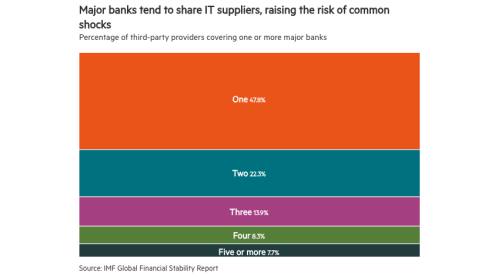Few financial centres have been unaffected by the financial chaos in London and New York. Due to globalisation, the liquidity crisis which started in the US mortgage market is now blowing through almost every financial market, making 2008 an annus horribilus for the financial services industry.
Speaking to a delegation of international bankers, Pierre Mirabaud, chairman of the Swiss Bankers Association, said: “This is absolutely no time for schadenfreude.”
Yet, despite difficult international credit markets and the inappropriateness of taking delight in the misfortunes of London and New York, the crumbling of dominant financial centres may, in the long term, open opportunities for up-and-coming financial centres in other parts of Europe and beyond, particularly those with little exposure to investment banking.
Smaller centres rising
Despite a large concentration of financial power in London and New York, smaller financial centres, which have developed rapidly in the past 10 years, are becoming highly competitive in niche markets. Many smaller financial centres do not expect to lose a single institution, or in many cases even a single job, while some banking centres, such as Switzerland, are still optimistically forecasting long-term growth in financial sector employment.
In September, in the midst of the financial meltdown on Wall Street, Switzerland announced a strategy to boost financial sector employment from 200,000 to 280,000 by 2015 by encouraging hedge funds and private equity firms with tax incentives and sympathetic regulation. However, other financial centres, such as the Cayman Islands, which has more than 200 companies as well as partnerships with Merrill Lynch and Lehman, may take longer to recover.
Employment situation
Sonja Kohn, chairman of Austria’s Bank Medici, says: “In Austria, we don’t expect a fall in financial sector employment, in fact I am not aware of a single person being fired yet from an Austrian bank.” Like leading Austrian banks, most foreign banks in Vienna are also focused on eastern Europe, which unlike more mature markets is far from over-leveraged and less affected by the crisis. Many banks in the region, including Bank Medici, are still making a return on equity of more than 20%.
Ms Kohn says: “[Austria] was very wise not to build its business in secrecy but to concentrate on location and service, although we did miss out on the derivatives business.”
Like Austria, Madrid’s growing financial sector is looking stronger and healthier than many other financial centres due to conservative regulation and close links to growing emerging market economies in Latin America. Isabel Martin Castella, general manager of the Madrid Financial Centre, says of Spain’s financial sector: “We used to complain about conservative regulation, but now we can see the benefits.”
Cross-border acquisitions
Martin Castella says that like all financial sectors, Madrid is suffering from the global disappearance of bank liquidity, but that this has created further opportunities for cross-border acquisitions: “This crisis is likely to provoke a further wave of consolidation in which some smaller institutions will disappear and some big banks will become bigger.”
Spain’s largest international banks, BBVA and Santander, have remained more focused on commercial rather than investment banking, giving them an advantage over counterparts in the UK, Germany, France and the US. While Spain’s banks move up the ranking of the world’s largest financial institutions, further acquisitions – such as the takeover of UK bank Alliance & Leicester by Santander in July for just €1.25bn, about half of what the bank had been worth six months previously – seem a distinct possibility.
Overseas expansion
Spanish banks are in a good position to expand overseas in the next few years and Ms Castella says that the banking crisis may be an opportunity for Spanish banks to export a business model that has so far proved successful, and disaster-proof.
Like other financial centres, Madrid has developed its own niche, focusing on its cultural heritage to position itself as the European hub for Latin American finance. With the US markets in the grip of financial turmoil, Madrid is likely to make headway against its main rival, Miami. In 1999, it launched Latibex, the first and only international market for Latin American securities and has more recently begun to target financial investment from Islamic institutions.
In the Netherlands, the Dutch authorities are also trying to position themselves as a specialist financial market, encouraging, for example, all financial services relating to retirement, financial logistics (including e-payment systems, and information and communication technology) and the sustainable investment sector.
Akkie Lansberg, managing director of the Holland Financial Centre, says: “Financial centres need to be recognised as centres of expertise in a few sub-sectors where they can excel and make their mark globally.”
Equity derivatives
The Netherlands’ financial sector, which employs about 300,000 people and is Europe’s second largest market for equity derivatives, behind London, is the region’s humble giant.
Robin Fransman of the Holland Financial Centre says: “This crisis is not the end of innovation, although it may be the end of one branch on innovation. For example, the lack of liquidity and pricing, particularly in the over-the-counter [OTC] derivatives market, may simply mark a return towards more transparent banking and the transfer of OTC instruments into the exchange traded market. Do not forget that we all benefited from derivatives, which made it possible for banks to offer lower mortgages for years.
When things recover, London may still reign supreme and keep its global leader status but other European centres will have developed niches in their own right.






